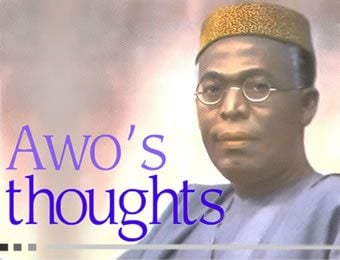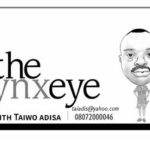ON the other hand, in order to be truly representative and be the most dependable means of expression of public opinion, Members of Parliament must be elected in a free and fair electoral contest. In other words, the electorate must in no way whatsoever be hindered, intimidated, defrauded, or misled, before and during the period of electioneering campaign, or at the time of casting their votes.
What all this boils down to, in actual practice, is this. – Before and during the elections campaign, every Nigerian citizen and every qualified political party should be free to go to any part of the country to canvass, privately and publicly, their views, and seek as vigorously as possible to win the support of the country’s voters; and, on polling day, every voter should be left free to cast his or her vote for any candidate he or she likes, under conditions, which ensure secrecy of voting, and equality, fairness, and justice to all the contending candidates. Any Parliament which is elected under conditions which are devoid of freedom and fairness cannot claim or be regarded as truly representing the people; and any group of people who emerge from such a Parliament or election as forming the Government of the day must be regarded as criminal impostors and usurpers.
In order, however, to ensure a free and fair election, it is imperative that there should be an Electoral Commission whose members are not only high-powered, independent, and impartial, but are also generally seen to be so. In Chapter 4, I have proposed that the Electoral Commission which would conduct the first general elections after the end of the present military regime should consist of (1) the Chairman of the Indian Electoral Commission as its Chairman, and (2) other members who shall be recommended for appointment by the United Nations Organisation.
I have two reasons for this suggestion. Firstly, this course of action is the only one open to us, in the circumstances of the inter-ethnic suspicion which would be bound to prevail or linger after the present war, and having regard to the pre-war blatant rigging of elections in spite of Nigerian-manned Electoral Commissions, to assure the Nigerian electorate as well as the world at large that we are determined to see to it that the arrangements for, and the actual conduct of, the elections are free and fair. Secondly, India is universally acclaimed as the largest democracy in the world. Besides, its elections since Independence have been equally acclaimed as free and fair, while its electorate is as preponderantly illiterate as ours. I am strongly of the opinion, therefore, that the Chairman of the Indian Electoral Commission is eminently qualified—better than anyone else—to preside over the affairs of our next general elections.
Some may argue that to invite outsiders to preside over our elections would derogate from our sovereignty. Most Nigerians certainly will not share this view. Since independence, we have invited outsiders to help us in planning our development, in formulating proposals for allocating revenue among the various governments in the country, etc., and we would do so again in the future for these and other purposes. If these courses of action did not derogate from our sovereignty, I do not see how the conduct of our election by outsiders, whose expertise, independence, impartiality, and integrity are acknowledged all over the world, can.
In other words, not only do we not lose anything by inviting this outside team, but we also gain tremendously, in the sense that the Parliament elected under these arrangements would be truly representative of our people. In addition, the resulting Governments would not only feel themselves duly accredited to speak for, and administer the affairs of this great country of ours, but would also be so regarded by the world at large.
(ii-vi), Other Statutory Commissions
We are all familiar with these Commissions and their individual functions. I believe that it is generally agreed that they should continue in being in the people’s republic of Nigeria. What cannot, at present, be regarded as generally agreed is the respective jurisdiction of the Public Service Commission and the Judicial Service Commission.
On page 126 of Thoughts on Nigerian Constitution I said as follows: ‘It is now generally agreed that the Public Service Commission, the Judicial Service Commission, and the Electoral Commission, should have jurisdiction over the entire Federation.’
This was the position in the country at the time I wrote those words, and up to the end of March 1968. But since then, that is with the coming into real existence of the 12 States, the climate of opinion has changed. It is very doubtful if any of the States, or any strong Body of enlightened opinion in the country, will now support the suggestion that the Public Service Commission and the Judicial Service Commission should, in the discharge of their respective functions, have jurisdiction in all parts of the Federation. What I have done on page 67 item 13 of this book, therefore, was merely to repeat what I had previously said on this matter in Thoughts on Nigerian Constitution and Tile People’s Republic. My present stand can be stated in these terms. As long as the members of each of these Commissions are appointed in a manner which puts their appointment beyond the control and decisive influence of the Executive, the Legislature, or any single individual, it is a matter of indifference to me whether their respective jurisdiction is country-wide, or whether each of the State and Federal Governments has its own Public Service Commission and Judicial Service Commission. Under Section 5, Chapter V of Thoughts 011 Nigerian Constitution, I have proposed the establishment of a COLLEGE OF APPOINTORS which, I believe, will make the appointment of the members of these Commissions completely free from any political influence.
With regard to Armed Forces Service Commission, Police Service Commission, and Prisons Service Commission, I said on page 130 of Tollgates Oil Nigerian Constitution, as follows:
‘The members of each of these Commissions should be appointed by the President, acting in accordance with the advice of the Prime Minister. If the latter is to discharge his responsibilities of maintaining the peace and safeguarding the security of the Federation, he must be given a free hand in dealing with the affairs of these three powerful arms of the country’s order and security. To those who may doubt the wisdom of this course, we have only this to say. The January revolution has taught a grim lesson which no future Prime Minister in Nigeria will ignore.’
I have only this to add in expatiation. Under my proposals, Police is a residual subject, because the immediate problem of maintaining law and order can only be properly and more effectively tackled by the State Governments. But since the ultimate responsibility for law and order in any part of the Federation is that of the Federal Government, it appears to me reasonable that the head of the Federal Government should be given the power to appoint the members of the Police Service Commission. There is no doubt that the Commission would of a necessity have to set up a committee in every State to assist it in the day-to-day and efficient discharge of its functions in every part of the Federation.
- Administrative Set-up
What is new in the four-tier Administrative Set-up proposed here is the Commune; and it is to this that I intend to confine my remarks.
According to the Concise Oxford Dictionary, ‘commune’ means: ‘French territorial division, smallest for administrative purposes; similar division elsewhere.’
The Commune is the smallest unit of adrninistration in Yugoslavia and, I believe, in some other socialist countries as well. In Britain, what may be said to be the equivalent of the Commune is the Parish. I have preferred the Commune to the Parish because of the religious connotation of the latter, and its inseparable historical connection with the Christian Church.
Why is it necessary to have the Commune in Nigeria, and how are the affairs of such a small unit of Government going to be efficiently administered? These are very important questions which I now proceed to answer.
Firstly, if properly and efficiently organised, the Commune would make the vast majority of our people much more intimate with the affairs of Government at the Local, State, and Federal levels. It would widen the base of Governmental pyramid, and so make the practice of democracy much closer still to the ideal of direct participation by the people in public affairs than is possible at the level of the average Local Government. In Thoughts of Nigeria Constitution on p. 149, I said that, ‘LocaI Governments provide so many arenas for training in public management for, and afford opportunities for participation in public life to, many more public-spirited citizens than would ever have chance at or even reach the State or Federal level.’ If this is so at Local Government level, it would be much more so in the Commune. With 6,000 or more well-organized and effectively functioning Communes in the country, it should be easy for any good government of the day in Nigeria, to reach and ascertain the wishes of the people in order to cater to them. It would also be easy for the citizens to communicate satisfyingly with their Governments, and to cultivate a true sense of belonging in so far as governmental activities are concerned.
Secondly, if efficiently and adequately staffed, the Communes would provide fruitful avenues for the collection and compilation of accurate and up-to-date information and data on such subjects as
(i) births, deaths, and other vital statistics;
(ii) Unemployment and underemployment;
(iii) Population, as well as its geographical and occupational distributions; and
(iv) Production, and market prices; which information and data would be communicated to the State and Federal Departments of Statistics.
It must be remarked that the population range of 5,000 to 10,000 has been chosen for the Commune in order to make it small enough – but not too small- for the accomplishment of the objects in view. In a village or quarter of this size, practically all the inhabitants know one another, and, with little or no effort, are usually well-informed about all the happenings among them and within their area. Besides, the Commune offers an optimum unit of population for the operation of preventive health services: one Health Centre will serve one or two Communes, as the case may be. (See page 60).
Thirdly, if competently staffed and properly organised, the Commune would be a very effective instrument for community development and for the mobilization of what, according to Balogh, on p. 331 of his book The Economics of Poverty, are known in the People’s China as ‘investment workers. In addition, the Commune’s full-time and part-time workers would take charge of and run such public services as the Postal Agency, Post Office Savings Bank, E.CN. Cash Office, etc.
To be continued





